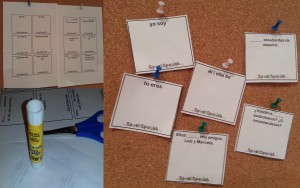Students from Beginners 1, 2 and 3 classes – and even at pre-intermediate level – find it very difficult to remember the verbs in Spanish. To make things easier we created a set of flashcards for you to start with. We will soon add more and more verbs used in the books Aula Internacional 1 and 2.
Click here to download the PDF file Flashcards verbos 1
Print all the copies and glue the pages together. Cut them out and you are ready to start using the flashcards!! Remember how we have worked with them in class. Note: some verbs don’t have an example, you’ll have to make them up. Ask your teacher to check them for you.
Why is it important to learn and remember verbs?
Yes! I agree it is boring and quite hard at the beginning but trust us, it is one of the pillars in learning Spanish. You do have to know the verbs (verbs are action words like cook, sleep, be, have etc) and their meaning; you then have to learn what conjugation goes with each pronoun (in English you say I am, you are, he is – I, you and he are pronouns and am, are, is are verbs… in Spanish you have the same, for each of the verbs you will have to remember the combination, you cannot say for example… I are).
It is very important to stick to the present tense and your teacher’s guidance. We know it is quite frustrating not to be able to speak in the past or the future but that is just a matter of time. If you concentrate all your efforts into remember the meaning of the verbs and the conjugation, the past and the future tense will be easier to learn and remember. If you try to learn all tenses at once (let’s say present, past and future tenses, you will feel it is an impossible task).
How to start with verbs (action words) in 5 steps
- Start with the irregular verbs, ‘ser’, ‘tener’, ‘estar’, ‘querer’, ‘ir’… etc what is the meaning? ‘ser’ means be, ‘tener’ means have, ‘estar’ means be, ‘querer’ means want to and ‘ir’ means go. In order to remember the meanings, it is perhaps a good idea to remember the first conjugation, the conbination for ‘I’ which is ‘yo’ in Spanish together with an example; it will be easier to remember the verbs with an example.
Yo soy Laura.
Yo tengo 32 años.
Yo estoy en mi casa.
Yo quiero aprender español.
Yo voy al parque.
- Go on with regular verbs such as ‘estudiar’, ‘comer’, ‘vivir’ and see if you can remember the first 3 conjugations in a context.
Yo estudio español
Tú estudias ingles en Australia.
Él estudia en la escuela de idiomas.
- Can you find other verbs that are similar to these 3? Can you remember the first 3 combinations?
estudiar conjugates as trabajar, caminar, hablar, etc.
comer conjugates as beber, leer, etc.
vivir conjugates as escribir, etc.
- Try to remember the other pronouns and conjugations
Nosotros estudiamos japonés.
¿Vosotros estudiáis griego?
Ellos estudian en la universidad.
- Little by little start adding other verbs.
gustar – like: Me gusta la pizza
interesa – interested: Me interesa la historia.
levantarse – get up: Yo me levanto a las 7 am.
Why is it crucial to learn in context rather than words from a list?
It is easier to learn from a context and at the same time you are learning other words and phrases. It does make it easier to remember too. You will see that it is quite hard to translate word by word; when you do that, it doesn’t make a lot of sense for a native speaker, that is why it is very useful to learn words in chunks and not in isolation – English works in the same way but you don’t have to think about it.
Learning words from a list is hard, boring and won’t make a lot of sense as you can’t associate the words with anything you’d like to say.
We hope you find them useful. We’ll be waiting for your comments. Hasta luego!






